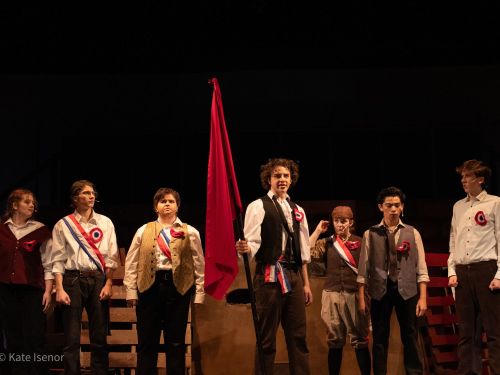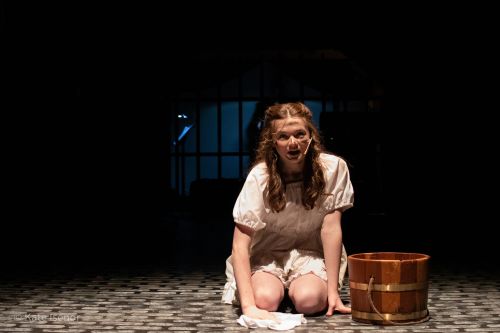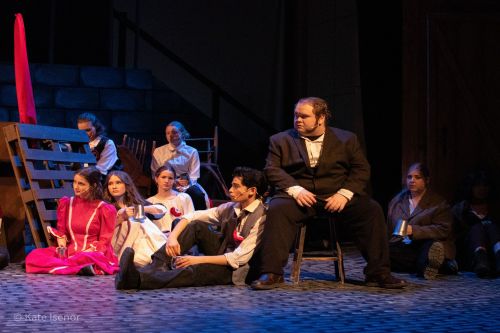Do you hear the students sing? Acadia grad brings revolution to rural music education in Nova Scotia

Among the casualties of the COVID-19 pandemic were arts programs across the country. Many that had been thriving were massively stripped back or entirely gutted in the catastrophic wake of the pandemic.
As Sarah Walker (B.Mus ’24; B.Ed. student) tells it, the pandemic’s effect on musicians and performers everywhere was “devastating.”
Coming back from the decimation of the arts scene hasn’t been easy, especially in rural areas where resources were somewhat limited to begin with. But performers and educators everywhere are putting in the work to revitalize it.
According to Dr. Christianne Rushton (Director, School of Music) “This is a critical time to rebuild after COVID. Music education needs our help.”
Some heroes wear all black
The call for help in Acadia’s corner of rural Nova Scotia has been answered by an intrepid three-time Acadia grad with a revolutionary vision and an all-black wardrobe. This February, Lyndsey “Mitch” Mitchell (’12, ’14, ‘19), director of the music program at Horton High School, is staging an ambitious multi-institution production of the notoriously challenging musical, Les Misérables.
The musical, celebrating its 40th anniversary this year, is a two and a half-hour show in the French operatic tradition. According to Dr. Rushton, Les Mis is “one of the hardest shows to do.”
“It takes a very strong person to want to do a show like this,” says Dr. Rushton. “Les Mis is not a show every high school could do, so it’s special that Horton is taking it on.”
And while Horton is centre stage in leading the production, they need a strong supporting cast to bring it to life. Lyndsey has called in community members from across the valley to put on a show that she’s hoping will give a substantial boost to the still-recovering post-pandemic arts scene.
Dr. Rushton says she's pleased that Lyndsey knew to ask "how big of a village do we need?"
She dreamed a dream

When Dr. Rushton heard about Lyndsey’s plan to put on Les Mis, she was eager for the Acadia School of Music (SOM) get involved.
“When we have a community partner out there doing the work, we want to help,” explains Dr. Rushton. “Not that Lyndsey needs the help, but when we see someone doing excellent things, we ask, ‘how can we support, uplift, and honour that?’”
SOM’s participation in community projects isn’t new. “This is who we are,” says Dr. Rushton. “It’s mission critical to our values and to what music means to the faculty here at SOM. Building relationships through music is what we’re all doing, all the time.”
The threads of connection with Acadia run much deeper than the School of Music’s involvement. From former Acadia students helping with set design, to Dr. Deanne van Rooyen from the Acadia Geology department playing piano and harp in the pit band and Dr. Rushton doing vocal coaching, the whole Acadia village is contributing.
To bring her long-time dream of a multi-institution musical to life, Lyndsey also called on students from Avon View High School and Quick as a Wink Theatre Company. According to Lyndsey, “the partnership is a true collaboration.”
Bring her home
When Lyndsey was placed at Horton during her B.Ed. practicum at Acadia, she says it had an “incredibly vibrant” arts program. But, like so many others, it took a hit during COVID. After spending a few years teaching in Grande Prairie, Alberta, Lyndsey got the chance to come back to the Maritimes as the director of Horton’s music program. Upon her return, she found that even after the pandemic decline, Horton’s arts programming still had “so much potential.” And while they were limited in their ability to put on performances in her first year, once restrictions were lifted, they “hit the ground running.”
Lyndsey says that a massive factor in the success she’s had in rebuilding the Horton music program is how supportive the Valley is. “The arts community here is so welcoming and easy to be a part of, not to mention the fact that there are so many opportunities for the arts here.”
“While we were in the beginning of our growth phase, if I needed instrumental parts covered, I could always count on SOM students to help out in our concerts,” she explains. “In fact, for our first show, three of the four musicians we needed for our pit band were Acadia students at that time.”
“I think that connection to Acadia has been an integral part of our success.”

Not on our own
Sarah Walker, who is not only a B.Ed. student, but also Lyndsey’s student teacher and the assistant director for Les Mis, has spent her life immersed in the community arts. She’s seen firsthand how powerful it can be when people come together to put on one heck of a show. “The more we all work to collaborate, the easier things can be,” she says. “But it also means you can work on a higher scale, and things end up happening that you never would have thought possible.”
“A lot of times,” explains Lyndsey, “I think people assume that because you are in a rural area, there will be fewer opportunities than if you were in a city, so I'd really like to see us change that narrative. A big way we do that is through collaboration. No matter who you are or what level of learners you're working with, no one can do it all, no matter how hard we try.”
“Bigger schools in bigger centres lose out on the possibility to be this deeply integrated and connected because they don’t have to be,” says Dr. Rushton. “But I think that’s their loss. We all benefit from collaboration.”
Lyndsey’ s students at Horton are aware of the benefits they reap from the collab. Liam Edelstein, who plays Thenardier, reflected that he’s enjoyed getting feedback on his performance from people with different experiences. “It has brought a lot of different perspectives to the way that I approach learning the music, as well as the way I have developed my acting and characterization.”
The diversity of experiences brought to the stage in the production is also showing the students at Horton what is possible for them in the future. Hannah Mainwaring, who is in the ensemble of Les Mis, says, “getting to see someone like Ms. (Sarah) Walker, who is studying to be a teacher and has experience working as an actress, has opened my eyes to the possibilities that I didn't know I had.”
Solidarity and revolution in harmony
One of the central themes of Les Mis—the importance of solidarity in revolution—is beautifully mirrored in this production of the musical. It has taken solidarity and community building to do something as bold, and dare we say revolutionary, as staging Les Mis to help rebuild the arts scene in the valley.
“Now more than ever we have this underlying gratitude to be able to work together in real time in the same space,” says Sarah. “It makes being involved in this collaboration even more special.”
Once the curtain falls for the final time on this production of Les Mis on March 1, the revolution won’t be over. For Lyndsey, this is just the beginning. “Making these connections and finding these opportunities to collaborate will continue to be something we do at Horton Music for years to come.”
Get the Acadia experience with Lyndsey Mitchell
This summer, Lyndsey is co-directing the Acadia Summer Music Academy from July 6-12. Stay tuned for more information later this spring!
